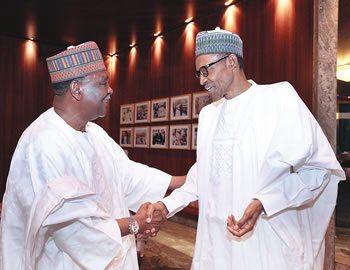Veteran journalist and former presidential media aide, Laolu Akande, has raised questions about the recent high-profile meeting of three prominent retired generals—former military presidents Ibrahim Babangida, Olusegun Obasanjo, and Abdulsalami Abubakar—in Minna, Niger State.
Speaking during the My Take segment of Inside Sources with Laolu Akande on Channels TV, Akande commended their patriotism but questioned the intent and transparency behind the gathering, especially in light of the notable absences of former military rulers, General Yakubu Gowon and President Muhammadu Buhari.
Akande pointed out that the meeting of the three generals in Minna was shrouded in secrecy, fueling media speculation and public curiosity about its true purpose.
He noted “There have been insinuations about the purpose of their meeting, which was clearly about the hardships in the land. And so, we commend their patriotism,” Akande said.
“However, short of General Abdulsalami, the other Generals in this Minna meeting did not attend the Council of State meeting which President Bola Tinubu convened not too long ago.”
Akande questioned why Generals Babangida and Obasanjo, who were absent from Tinubu’s recently convened Council of State meeting, chose to meet in Minna instead in secret mode to discuss the State of the Nation, ostensibly.
The Council of State is a constitutional body designed to allow former heads of state to offer counsel and guidance to the incumbent president on matters of national importance.
Their absence at the Council, a forum with public accountability, left Akande wondering why they had not taken the opportunity to voice their concerns there.
“There was no public disclosure as to why they were absent [from the Council of State meeting]. At that meeting, a dramatically announced vote of confidence was made in support of the President. Wouldn’t it have been better for all the Generals, as former heads of state, to have attended such a meeting and made their views known at a statutory forum with some measures of accountability to the public rather than this coded gathering in Minna, with its real purpose shrouded in secrecy?” Akande queried.
He expressed concern over what he described as an “overtly encrypted gathering,” warning that such a secretive meeting of powerful former military leaders, especially without a post-meeting communiqué, could easily stir up political unrest and raise unnecessary speculation.
The fact that no clear outcomes or statements emerged from the Minna meeting only intensified the uncertainty surrounding its purpose, leading to rumors in the press.
“For instance, after the Minna meeting, there were no communiqués, and this led to insinuations in the press, with speculations that the Generals met to find a way to get rid of the incumbent, possibly at the polls,” Akande noted, further criticizing the lack of transparency.
He also highlighted a broader issue concerning Nigeria’s political evolution from military to civilian rule. According to Akande, the country’s long history of military dictatorship has left a legacy of secrecy and a disdain for public accountability.
He cautioned that the conduct of retired generals, especially in the political arena, should reflect a commitment to open dialogue and transparency—qualities that define a democracy, not military rule.
“A lot of Nigeria’s retrogression can be traced to military rulers. So, all these side attacks by past military heads of state on the incumbent president regarding problems that have been long-standing are not necessary,” Akande emphasized.
He urged the retired generals to embrace their roles as statesmen, advocating for more public and accountable engagements rather than secretive meetings that only serve to fuel speculation.
Akande’s critique also extended to their responsibilities as former leaders, suggesting that their input would have been better received at the Council of State, where the structure of accountability to the Nigerian public is embedded.
He called on all former leaders, including Generals Gowon and Buhari, to continue contributing constructively and transparently to national discourse, especially at times of economic uncertainty such as now.

 Join Daily Trust WhatsApp Community For Quick Access To News and Happenings Around You.
Join Daily Trust WhatsApp Community For Quick Access To News and Happenings Around You.


